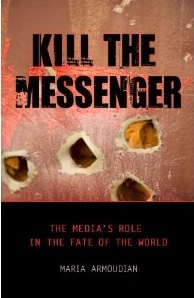Q&A: Steven Hill-10 Steps to Repair US Democracy
Written on March 20th, 2012 |
Aired 03/18/12
Among the things that most people agree are in big trouble these days are the European Union and democracy in the US. I will talk with today’s guest, STEVEN HILL, about both.
We have been hearing for two years about the trouble Europe is in. The debt crisis in Greece, Spain, Portugal, Ireland and beyond is challenging this federation of nations and economies to share the solutions to problems that have proven worst in individual countries who took greater risks than their more prudent neighbors. After Europe seemed to have fared better than the US in the early stages of this prolonged crash, what brought on this crisis? How close are they to solving it? How close are they to blowing it? What would Hill’s advice be? And what does it mean for the rest of the world and for the US in particular?
While the bad news of this Euro crisis makes headlines in the US, what has not made headlines is the good news contained in HILL’s 2010 book EUROPE’S PROMISE. I will check in with Hill about the current state of that promise.
Closer to home, HILL believes that America’s recent economic collapse was preceded by a longer-term political collapse. Even before the economic crisis, the US faced choice-less elections, out-of-control campaign spending,partisan polarization, a rigidly divided Congress, a filibuster-wild U.S. Senate, superficial debate, mindless media, a partisan Supreme Court, and paralysis in the face of new global challenges.
As the middle collapses and partisans take over, Americans’ frustration grows – witness the Tea Party and the 99%. In a brand new 2012 Election edition of his 2006 book, Steven Hill renews his 10 Steps to Repair American Democracy.
Q&A: MARIA ARMOUDIAN, Journalist/Radio Host
Written on August 12th, 2011 |
Aired 08/08/11
KILL THE MESSENGER emerged from MARIA ARMOUDIAN's studies into the causes of genocide, war, peacemaking, democratization, and the protection of human rights and the environment, while she was working on her Ph.D. at the University of Southern California, as well as during her work as a broadcast journalist and public official. Looking across conflicts and policy successes and failures, she found that media (and media professionals) were among key factors in determining political outcomes, including matters of life and death.
Written in five parts, KILL THE MESSENGER shows how media fomented rage and genocide in Rwanda, the Holocaust and the Bosnian war; how they helped bring peace in the Northern Ireland Conflict and the war in Burundi; how media contributed to democratization and the protection of human rights in South Africa, Taiwan, Mexico, and Senegal, and how they aided both the destruction and rebuilding of democracy in Chile. In its final case study, Kill the Messenger explores the media's role in the fate of the world, as journalists disentangle the issue of climate change for the public.
The book's forward was written by Tom Hayden.
